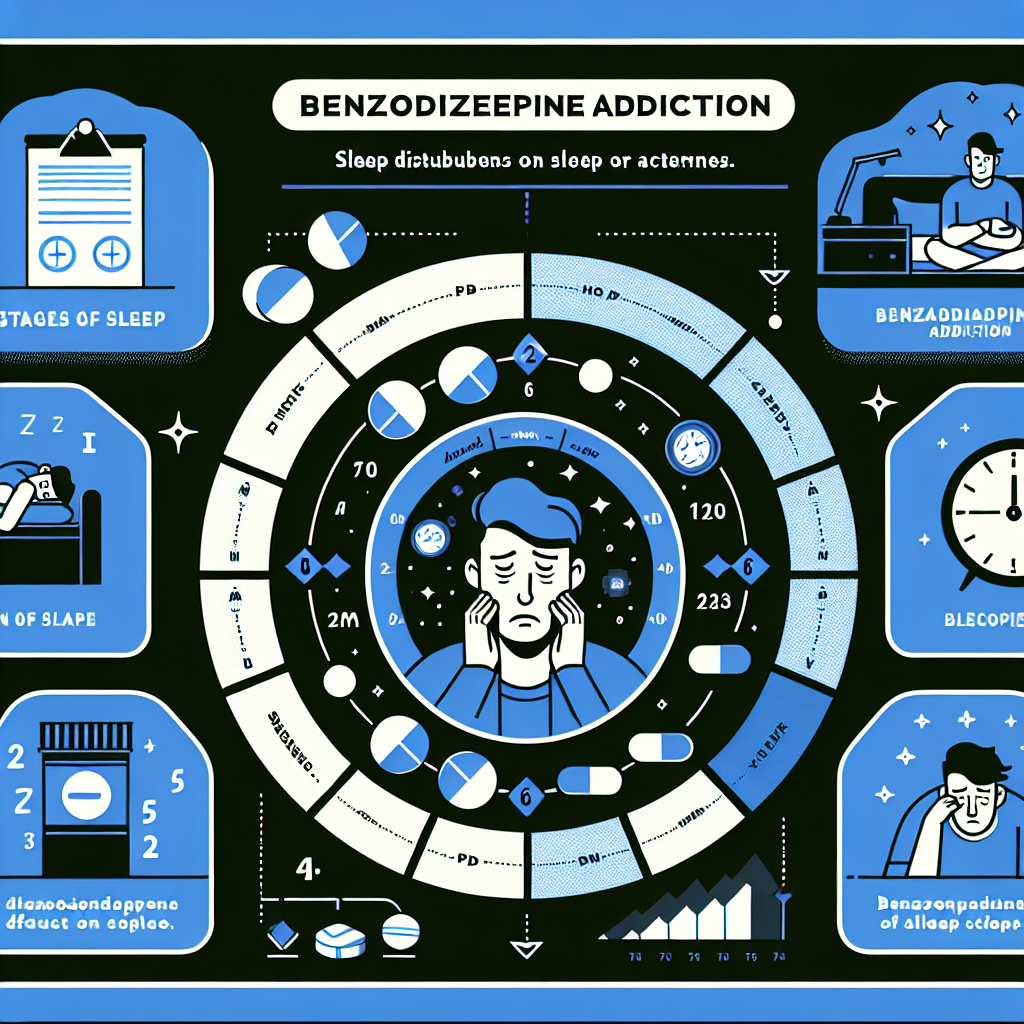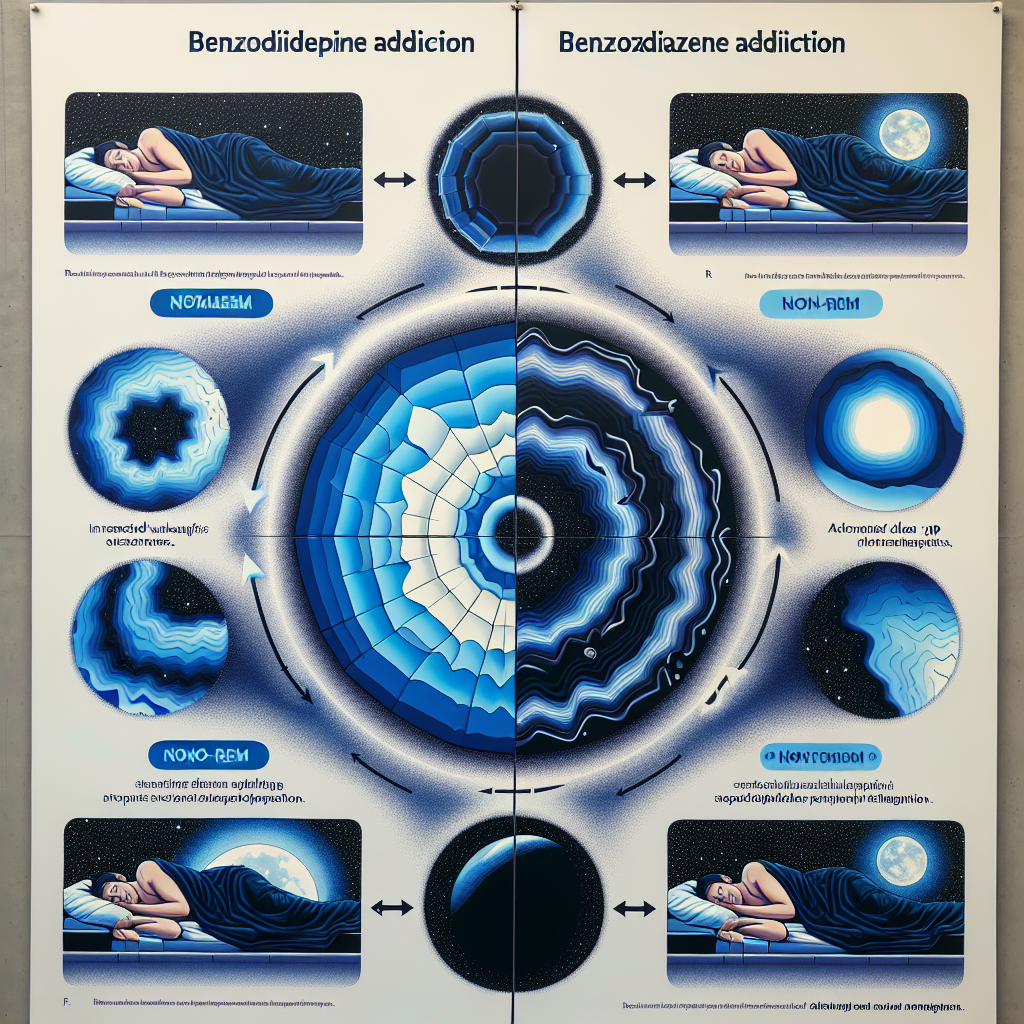-
Table of Contents

“Addiction to benzodiazepines disrupts natural sleep cycles, leading to fragmented and less restorative sleep.”
Introduction
Addiction to benzodiazepines can significantly disrupt sleep patterns, leading to a range of sleep-related issues. Benzodiazepines are commonly prescribed for their sedative and anxiolytic effects, often used to treat conditions such as anxiety, insomnia, and seizures. However, with prolonged use, individuals can develop a tolerance to these medications, requiring higher doses to achieve the same effects. This tolerance can lead to dependence and addiction, which in turn can severely impact sleep architecture. Chronic use of benzodiazepines can alter the natural sleep cycle, reducing the time spent in restorative deep sleep (slow-wave sleep) and REM (rapid eye movement) sleep, which are crucial for physical and mental recovery. Additionally, withdrawal from benzodiazepines can cause rebound insomnia, characterized by difficulty falling asleep, frequent awakenings, and poor sleep quality. These disruptions can exacerbate the very conditions benzodiazepines were initially prescribed to treat, creating a vicious cycle of dependency and sleep disturbance.
The Impact of Benzodiazepine Addiction on REM Sleep Cycles
Benzodiazepines, often prescribed for anxiety, insomnia, and other conditions, have a profound impact on sleep patterns, particularly on the REM (Rapid Eye Movement) sleep cycle. Understanding how addiction to these medications affects sleep can inspire individuals to seek healthier alternatives and regain control over their sleep health.
Initially, benzodiazepines can seem like a miracle solution for those struggling with sleep disorders. They work by enhancing the effect of the neurotransmitter GABA, which promotes relaxation and induces sleep. However, the relief they provide is often short-lived. Over time, the body builds a tolerance to the drug, requiring higher doses to achieve the same effect. This dependency can lead to addiction, which significantly disrupts natural sleep patterns.
One of the most critical aspects of sleep affected by benzodiazepine addiction is the REM sleep cycle. REM sleep is essential for cognitive functions such as memory consolidation, learning, and emotional regulation. During this phase, the brain is highly active, and dreams occur. Benzodiazepines suppress REM sleep, leading to a reduction in both the duration and quality of this crucial sleep stage. As a result, individuals may experience memory problems, difficulty concentrating, and emotional instability.
Moreover, the suppression of REM sleep can have a cascading effect on overall sleep architecture. The body cycles through different sleep stages multiple times a night, and each stage plays a unique role in physical and mental restoration. When REM sleep is compromised, the balance of these cycles is disrupted, leading to fragmented and less restorative sleep. This can exacerbate feelings of fatigue and contribute to a vicious cycle of increased benzodiazepine use in an attempt to achieve restful sleep.
The impact of benzodiazepine addiction on sleep is not limited to REM sleep alone. These medications also affect non-REM sleep stages, particularly the deep sleep stages (slow-wave sleep). Deep sleep is crucial for physical recovery, immune function, and overall health. Benzodiazepines can reduce the amount of time spent in deep sleep, further diminishing the restorative quality of sleep. This can lead to a weakened immune system, increased susceptibility to illnesses, and a general decline in physical health.
Recognizing the detrimental effects of benzodiazepine addiction on sleep patterns is the first step towards recovery. It is essential to approach this issue with a sense of hope and determination. There are numerous strategies and treatments available to help individuals overcome addiction and restore healthy sleep patterns. Cognitive-behavioral therapy for insomnia (CBT-I) is one such effective approach. It focuses on changing sleep habits and behaviors, addressing the underlying causes of insomnia without relying on medication.
Additionally, lifestyle changes can play a significant role in improving sleep quality. Establishing a regular sleep schedule, creating a relaxing bedtime routine, and reducing exposure to screens before bed can all contribute to better sleep hygiene. Mindfulness practices, such as meditation and deep breathing exercises, can also help reduce anxiety and promote relaxation, making it easier to fall asleep naturally.
In conclusion, while benzodiazepines may offer temporary relief for sleep disorders, their long-term use and potential for addiction can severely disrupt REM sleep cycles and overall sleep quality. By understanding these impacts and seeking healthier alternatives, individuals can take proactive steps towards reclaiming their sleep health and enhancing their overall well-being. The journey to recovery may be challenging, but with the right support and determination, it is entirely possible to achieve restful, restorative sleep once again.
How Benzodiazepine Dependence Disrupts Natural Sleep Architecture
Benzodiazepines, often prescribed for anxiety, insomnia, and other conditions, can profoundly impact sleep patterns when used over extended periods. While these medications are effective in the short term, their long-term use can lead to dependence, which in turn disrupts the natural architecture of sleep. Understanding how benzodiazepine dependence affects sleep can inspire individuals to seek healthier alternatives and regain control over their sleep health.
Initially, benzodiazepines may seem like a miracle solution for those struggling with insomnia. They work by enhancing the effect of the neurotransmitter gamma-aminobutyric acid (GABA), which promotes relaxation and induces sleep. However, as the body becomes accustomed to the presence of the drug, tolerance develops, necessitating higher doses to achieve the same effect. This cycle of increasing dosage can lead to physical and psychological dependence, making it difficult to discontinue use without experiencing withdrawal symptoms.
One of the most significant ways benzodiazepine dependence disrupts sleep is by altering the natural sleep architecture. Sleep is composed of several stages, including light sleep, deep sleep, and rapid eye movement (REM) sleep. Each stage plays a crucial role in overall health and well-being. Benzodiazepines tend to suppress REM sleep and deep sleep, which are essential for cognitive function, emotional regulation, and physical restoration. As a result, individuals dependent on these medications often experience fragmented and less restorative sleep.
Moreover, the suppression of REM sleep can have far-reaching consequences. REM sleep is vital for memory consolidation and emotional processing. When this stage is consistently disrupted, individuals may find it challenging to retain new information and manage stress effectively. Over time, the lack of adequate REM sleep can contribute to cognitive decline and emotional instability, further exacerbating the issues that benzodiazepines were initially prescribed to address.
In addition to altering sleep architecture, benzodiazepine dependence can lead to a phenomenon known as rebound insomnia. When individuals attempt to reduce or discontinue their use of benzodiazepines, they often experience a temporary worsening of their sleep problems. This rebound effect can be severe, leading to increased anxiety and a return to the very symptoms that prompted the use of the medication in the first place. The fear of experiencing rebound insomnia can make it even more challenging for individuals to break free from their dependence on benzodiazepines.
Despite these challenges, it is possible to restore natural sleep patterns and improve overall sleep quality. Gradual tapering of benzodiazepine use, under the guidance of a healthcare professional, can help minimize withdrawal symptoms and reduce the risk of rebound insomnia. Additionally, adopting healthy sleep habits, such as maintaining a consistent sleep schedule, creating a relaxing bedtime routine, and avoiding stimulants before bed, can support the transition to drug-free sleep.
Cognitive-behavioral therapy for insomnia (CBT-I) is another effective approach for addressing sleep disturbances without the use of medication. CBT-I focuses on identifying and changing negative thought patterns and behaviors that contribute to insomnia. By addressing the root causes of sleep problems, individuals can develop healthier sleep habits and improve their overall quality of life.
In conclusion, while benzodiazepines can provide short-term relief for sleep disturbances, their long-term use can lead to dependence and significant disruptions in natural sleep architecture. By understanding the impact of benzodiazepine dependence on sleep and exploring alternative treatments, individuals can take proactive steps toward achieving restorative, drug-free sleep. This journey may require patience and perseverance, but the rewards of improved sleep and overall well-being are well worth the effort.
Q&A
1. Addiction to benzodiazepines can lead to disrupted sleep architecture, including reduced REM sleep and deep sleep stages, resulting in less restorative sleep.
2. Over time, dependence on benzodiazepines can cause tolerance, requiring higher doses to achieve the same sedative effects, which can further exacerbate sleep disturbances and lead to insomnia.
Conclusion
Addiction to benzodiazepines can significantly disrupt sleep patterns. Initially, these medications may promote sleep by enhancing the effect of the neurotransmitter GABA, which has a calming effect on the brain. However, with prolonged use and addiction, the body develops tolerance, requiring higher doses to achieve the same effect. This can lead to dependence and withdrawal symptoms, which often include severe insomnia, fragmented sleep, and reduced overall sleep quality. Additionally, long-term use can alter the natural sleep architecture, reducing the time spent in restorative deep sleep and REM sleep, further exacerbating sleep disturbances.



